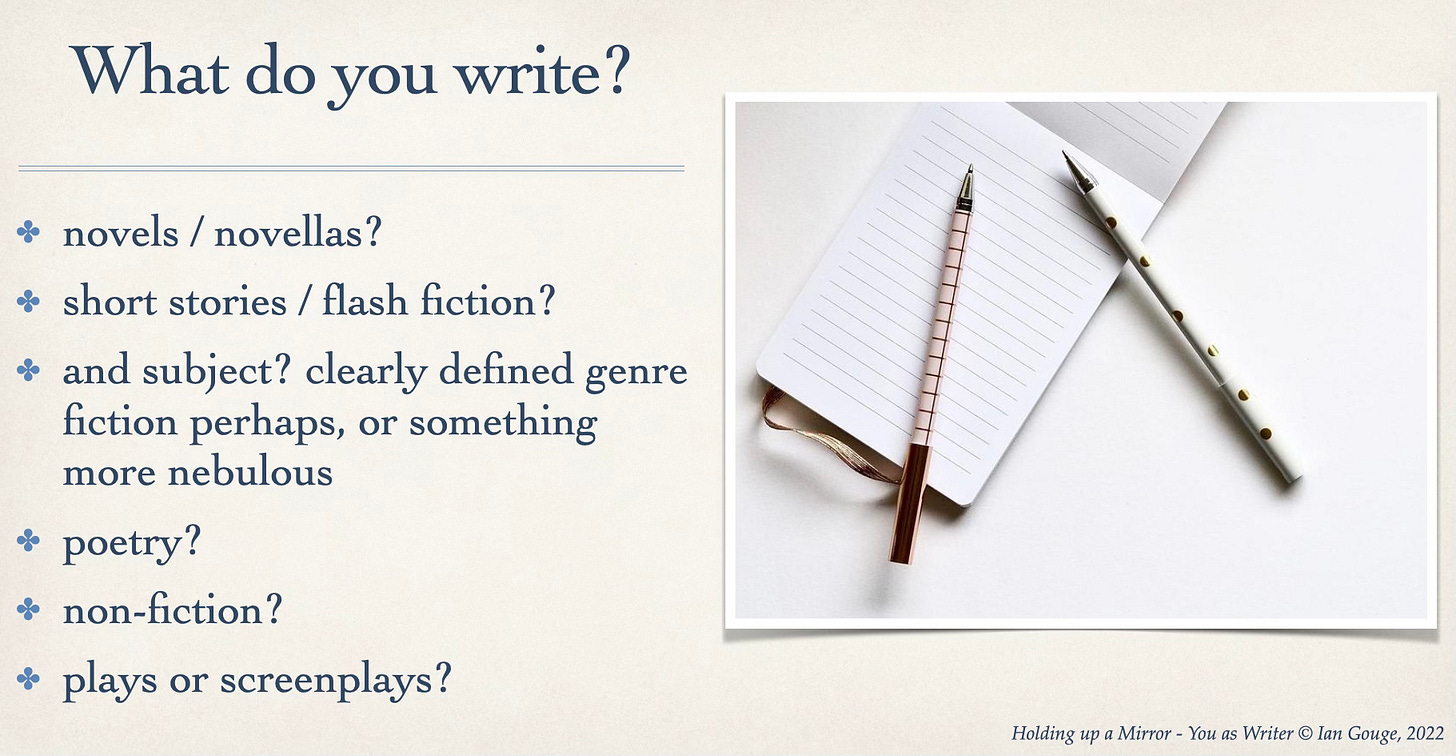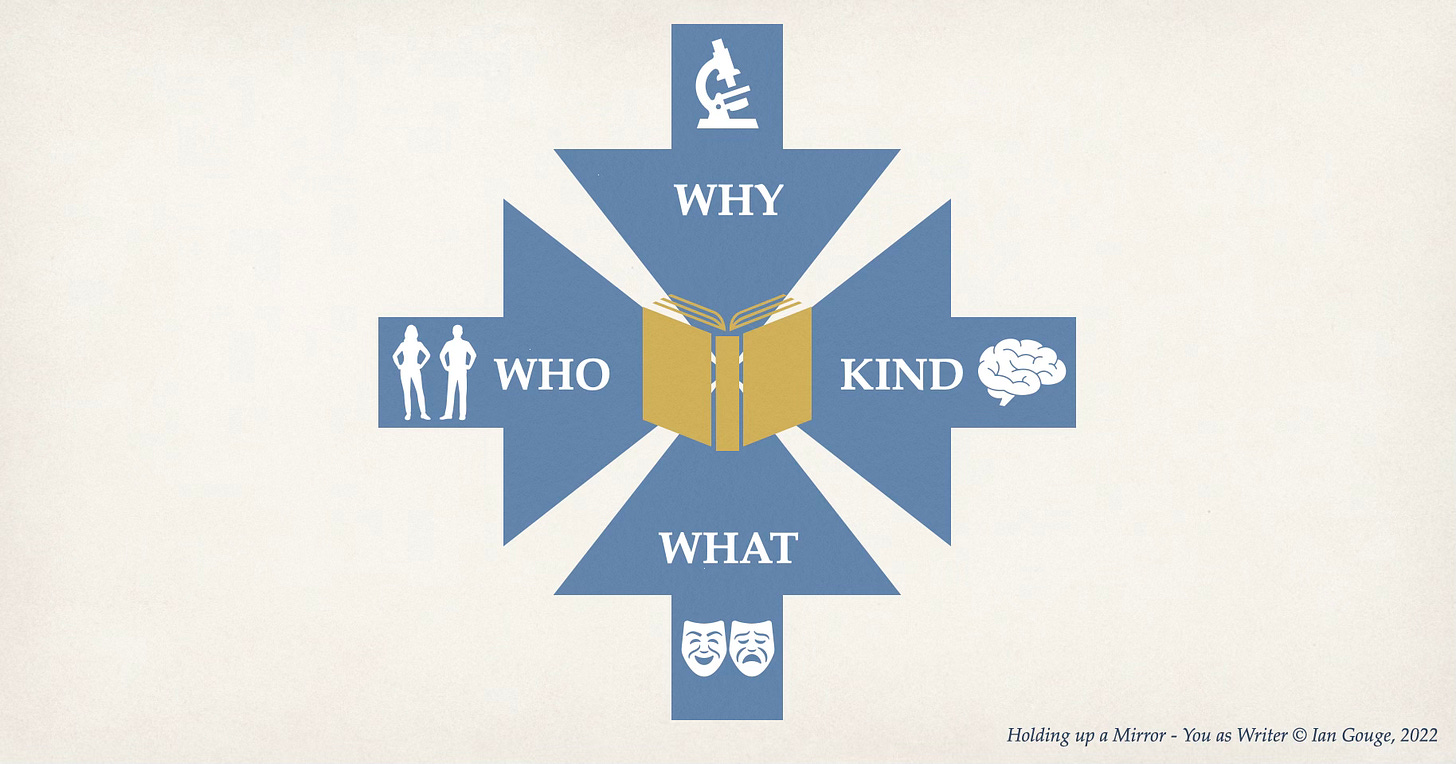There is no 'Right way' to write... (5)
The final question: what are you writing - and is it a good 'fit'?
If you’ve stayed with me over the last few posts in this series, hopefully you will have answered three key questions:
Why do you write?
Who do you write for?
What kind of writer are you?
And in doing so perhaps you have been able to appreciate where your answers are in harmony - and where they may not be. As I have said before, alignment is key.
As we reach the last question, you might imagine that the winning post is in sight. If you have reached this point smoothly and serenely, and expect this final poser to be a formality, be warned; it may not be. Alternatively, you might be slightly nervous about it given your previous answers feel somehow out-of-kilter.
Well, how you answer this last question may just help the pieces fall into place, especially as answering this last question is, of course, the easiest of them all - but that doesn’t mean that your answer will be the ‘right’ one…
Question 4: What are you writing?
Easy-peasy. Just take a look on your desk, in your notebook, at the files on your computer. Somewhere there will be a tangible thing (or things) that you are creating. For example:
At last the opportunity to come up with a definitive answer!
And it may be an answer which promotes a ‘so what?’ question of its own. But that would be to take a too simplistic a view.
Okay, so you’re writing a novel - but have you ever stopped to ask yourself if that’s the ‘best’ thing for you to write? The answer to this fourth question is actually as open to challenge as the other three we’ve already considered.
And you really should challenge each of them. Why?
Because when we produce our best, most effective, most appropriate work - that which will give us the greatest degree of satisfaction and is likely to make the most of our talents - each of our four answers will be aligned, in harmony. The why?, who?, type? and what? will be mutually supporting; there will be nothing jarring. And when we reach this state, the magic happens!
Just some simple examples of conflict:
Why? you write to make money. What? you write poetry. Well that’s a circle that will probably only be squared if you’re the poet laureate!
Type? you’re a reluctant and occasional writer. What? you’re writing a trilogy of epic novels. Okay, so it took Tolkien 17 years to write Lord of the Rings, but let’s be honest, you’re not Tolkien, and so the chances are that you’ll never finish what you’ve started.
Who? you write solely for yourself. What? you’re writing some kind of self-help book for others. Ask yourself, is your heart really in it?
Why? you write to be famous and for posterity. What? an occasional blog with no specific theme, angle, niche, or audience.
There will be hundreds of combinations of answers that will not be comfortable bedfellows one way or another, and when this happens you will find yourself - consciously or not - struggling. Most often this struggle manifests itself via difficulty in producing the ‘what’ i.e. the novel’s not quite working, the poems are a little ‘flat’, your genre-worlds are unconvincing etc.
Each of the four elements can be changed to various degrees in order to improve you as a writer:
Why? just be honest about this one; it is the bedrock of everything - and because of that, potentially immutable. The first step: honest recognition of your writing truth.
Who? again this is about recognition and self-awareness. You might not change anything here (i.e. you might not choose to write for someone else) but, even if it’s you, understanding your primary audience is vital - as in the example where you have a contract/deadline to meet and you need to understand that you aren’t really writing for yourself any more.
Type? this is the process question - and you can change if you a) need to, and b) have the willpower/freedom to do so. The epic fantasy trilogy example above surely demands a structured and robust process rather than a haphazard one! And if you can’t change your process - because that’s simply the way you are ‘made’ - then recognise and embrace what type of writer you are without feeling guilty that you don’t conform to some imagined ‘ideal’ (most often quoted is the predominately middle-aged white male ‘type’ of working 9am-12am, producing 2,000 words a day).
What? the easiest one to change. You may think you should be writing a novel or poetry or a murder mystery, but the previous three answers might not support that as a viable outcome. Look at the why?, who? and type?, and see what product does fit. If the what? is a given - say you have a contract to write a novel - then you may need to look hard at the other three if the book is not going well. In each of the three examples immediately above, the ‘what’ doesn’t fit with the rest of the profile…
Instinctively you will know when these four elements are in synch - and what you produce will demonstrate as much. In my work as a mentor I have met people who:
discovered they were writing for their inner-editor who was continually getting in the way of making progress because they wanted perfection all the time [very common, this one; and given first drafts are rarely perfect, it’s better to give yourself permission to write something imperfect and then edit it later - rather than write nothing new at all];
thought they were still writing for themselves when they had a contract to fulfil and hadn’t got their head around the fact that writing had become a ‘job’ [i.e. they were actually writing for someone else, but hadn’t accepted it];
thought they needed to write a novel - because that’s what proved you were a writer [such a common misconception!] - when other answers (and supporting collateral) suggested that they should have been focussing on short stories. A warning sign: when you find yourself uttering the phrase “I’m writing my novel…”
And so on…
Tackling these four basic questions can be a simple exercise undertaken in ten minutes - or mulled over for days. Your choice. But please don’t treat them superficially, nor just glibly accept the ‘textbook answers’: “I write because I love it”; “I write for myself”; “I write when the muse takes me / I’m inspired”; “I’m writing my novel”. Those answers might be right - but they may not…
If you have a question about your responses to the questions and how they do or do not align - and you are a paying subscriber - then I’m happy to offer advice. Just post a comment.
In any event, I hope you have found the notions behind these posts of interest. If so, please share with your fellow writers; the theory can hopefully be applied universally.
I was going to put this post behind a paywall, after all it’s my intellectual property, my effort has gone into it, and the site is part of my livelihood. You wouldn’t do a week’s work for someone and then tell them not to bother paying you…
But then I decided not to. However, if you’d like to support me…





Wonderful points, Ian, I find myself moving through the WHAT. First writing memoir, then novels, some poems published, and now short stories. Go figure.